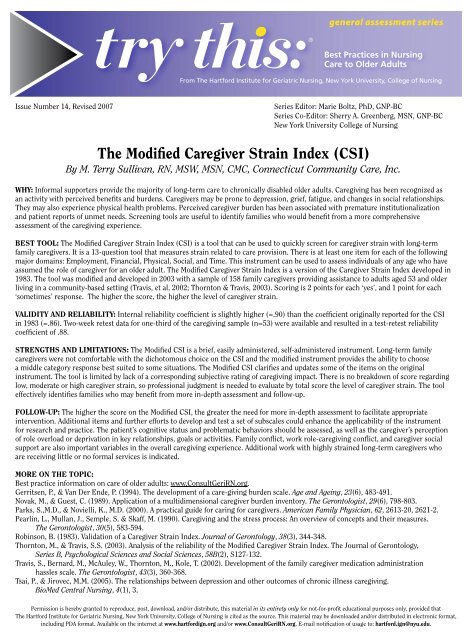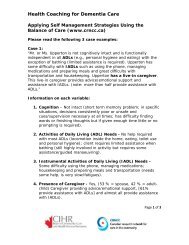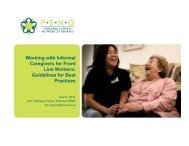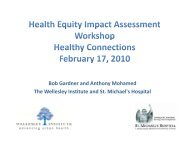The Modified Caregiver Strain Index (CSI) - solutions - east toronto's ...
The Modified Caregiver Strain Index (CSI) - solutions - east toronto's ...
The Modified Caregiver Strain Index (CSI) - solutions - east toronto's ...
Create successful ePaper yourself
Turn your PDF publications into a flip-book with our unique Google optimized e-Paper software.
general assessment series<br />
Best Practices in Nursing<br />
Care to Older Adults<br />
From <strong>The</strong> Hartford Institute for Geriatric Nursing, New York University, College of Nursing<br />
Issue Number 14, Revised 2007<br />
Series Editor: Marie Boltz, PhD, GNP-BC<br />
Series Co-Editor: Sherry A. Greenberg, MSN, GNP-BC<br />
New York University College of Nursing<br />
<strong>The</strong> <strong>Modified</strong> <strong>Caregiver</strong> <strong>Strain</strong> <strong>Index</strong> (<strong>CSI</strong>)<br />
By M. Terry Sullivan, RN, MSW, MSN, CMC, Connecticut Community Care, Inc.<br />
WHY: Informal supporters provide the majority of long-term care to chronically disabled older adults. Caregiving has been recognized as<br />
an activity with perceived benefits and burdens. <strong>Caregiver</strong>s may be prone to depression, grief, fatigue, and changes in social relationships.<br />
<strong>The</strong>y may also experience physical health problems. Perceived caregiver burden has been associated with premature institutionalization<br />
and patient reports of unmet needs. Screening tools are useful to identify families who would benefit from a more comprehensive<br />
assessment of the caregiving experience.<br />
BEST TOOL: <strong>The</strong> <strong>Modified</strong> <strong>Caregiver</strong> <strong>Strain</strong> <strong>Index</strong> (<strong>CSI</strong>) is a tool that can be used to quickly screen for caregiver strain with long-term<br />
family caregivers. It is a 13-question tool that measures strain related to care provision. <strong>The</strong>re is at l<strong>east</strong> one item for each of the following<br />
major domains: Employment, Financial, Physical, Social, and Time. This instrument can be used to assess individuals of any age who have<br />
assumed the role of caregiver for an older adult. <strong>The</strong> <strong>Modified</strong> <strong>Caregiver</strong> <strong>Strain</strong> <strong>Index</strong> is a version of the <strong>Caregiver</strong> <strong>Strain</strong> <strong>Index</strong> developed in<br />
1983. <strong>The</strong> tool was modified and developed in 2003 with a sample of 158 family caregivers providing assistance to adults aged 53 and older<br />
living in a community-based setting (Travis, et al, 2002; Thornton & Travis, 2003). Scoring is 2 points for each ‘yes’, and 1 point for each<br />
‘sometimes’ response. <strong>The</strong> higher the score, the higher the level of caregiver strain.<br />
VALIDITY AND RELIABILITY: Internal reliability coefficient is slightly higher (=.90) than the coefficient originally reported for the <strong>CSI</strong><br />
in 1983 (=.86). Two-week retest data for one-third of the caregiving sample (n=53) were available and resulted in a test-retest reliability<br />
coefficient of .88.<br />
STRENGTHS AND LIMITATIONS: <strong>The</strong> <strong>Modified</strong> <strong>CSI</strong> is a brief, easily administered, self-administered instrument. Long-term family<br />
caregivers were not comfortable with the dichotomous choice on the <strong>CSI</strong> and the modified instrument provides the ability to choose<br />
a middle category response best suited to some situations. <strong>The</strong> <strong>Modified</strong> <strong>CSI</strong> clarifies and updates some of the items on the original<br />
instrument. <strong>The</strong> tool is limited by lack of a corresponding subjective rating of caregiving impact. <strong>The</strong>re is no breakdown of score regarding<br />
low, moderate or high caregiver strain, so professional judgment is needed to evaluate by total score the level of caregiver strain. <strong>The</strong> tool<br />
effectively identifies families who may benefit from more in-depth assessment and follow-up.<br />
FOLLOW-UP: <strong>The</strong> higher the score on the <strong>Modified</strong> <strong>CSI</strong>, the greater the need for more in-depth assessment to facilitate appropriate<br />
intervention. Additional items and further efforts to develop and test a set of subscales could enhance the applicability of the instrument<br />
for research and practice. <strong>The</strong> patient’s cognitive status and problematic behaviors should be assessed, as well as the caregiver’s perception<br />
of role overload or deprivation in key relationships, goals or activities. Family conflict, work role-caregiving conflict, and caregiver social<br />
support are also important variables in the overall caregiving experience. Additional work with highly strained long-term caregivers who<br />
are receiving little or no formal services is indicated.<br />
MORE ON THE TOPIC:<br />
Best practice information on care of older adults: www.ConsultGeriRN.org.<br />
Gerritsen, P., & Van Der Ende, P. (1994). <strong>The</strong> development of a care-giving burden scale. Age and Ageing, 23(6), 483-491.<br />
Novak, M., & Guest, C. (1989). Application of a multidimensional caregiver burden inventory. <strong>The</strong> Gerontologist, 29(6), 798-803.<br />
Parks, S.,M.D., & Novielli, K., M.D. (2000). A practical guide for caring for caregivers. American Family Physician, 62, 2613-20, 2621-2.<br />
Pearlin, L., Mullan, J., Semple, S. & Skaff, M. (1990). Caregiving and the stress process: An overview of concepts and their measures.<br />
<strong>The</strong> Gerontologist, 30(5), 583-594.<br />
Robinson, B. (1983). Validation of a <strong>Caregiver</strong> <strong>Strain</strong> <strong>Index</strong>. Journal of Gerontology, 38(3), 344-348.<br />
Thornton, M., & Travis, S.S. (2003). Analysis of the reliability of the <strong>Modified</strong> <strong>Caregiver</strong> <strong>Strain</strong> <strong>Index</strong>. <strong>The</strong> Journal of Gerontology,<br />
Series B, Psychological Sciences and Social Sciences, 58B(2), S127-132.<br />
Travis, S., Bernard, M., McAuley, W., Thornton, M., Kole, T. (2002). Development of the family caregiver medication administration<br />
hassles scale. <strong>The</strong> Gerontologist, 43(3), 360-368.<br />
Tsai, P., & Jirovec, M.M. (2005). <strong>The</strong> relationships between depression and other outcomes of chronic illness caregiving.<br />
BioMed Central Nursing, 4(1), 3.<br />
Permission is hereby granted to reproduce, post, download, and/or distribute, this material in its entirety only for not-for-profit educational purposes only, provided that<br />
<strong>The</strong> Hartford Institute for Geriatric Nursing, New York University, College of Nursing is cited as the source. This material may be downloaded and/or distributed in electronic format,<br />
including PDA format. Available on the internet at www.hartfordign.org and/or www.ConsultGeriRN.org. E-mail notification of usage to: hartford.ign@nyu.edu.
<strong>Modified</strong> <strong>Caregiver</strong> <strong>Strain</strong> <strong>Index</strong><br />
Directions: Here is a list of things that other caregivers have found to be difficult. Please put a checkmark in the columns that apply to you.<br />
We have included some examples that are common caregiver experiences to help you think about each item. Your situation may be slightly<br />
different, but the item could still apply.<br />
Yes, On a Regular Basis=2 Yes, Sometimes =1 No=0<br />
My sleep is disturbed ____________ ____________ ____________<br />
(For example: the person I care for is in and out of bed or<br />
wanders around at night)<br />
Caregiving is inconvenient ____________ ____________ ____________<br />
(For example: helping takes so much time or it’s a long<br />
drive over to help)<br />
Caregiving is a physical strain ____________ ____________ ____________<br />
(For example: lifting in or out of a chair; effort or concentration<br />
is required)<br />
Caregiving is confining ____________ ____________ ____________<br />
(For example: helping restricts free time or I cannot go visiting)<br />
<strong>The</strong>re have been family adjustments ____________ ____________ ____________<br />
(For example: helping has disrupted my routine; there is no privacy)<br />
<strong>The</strong>re have been changes in personal plans ____________ ____________ ____________<br />
(For example: I had to turn down a job; I could not go on vacation)<br />
<strong>The</strong>re have been other demands on my time ____________ ____________ ____________<br />
(For example: other family members need me)<br />
<strong>The</strong>re have been emotional adjustments ____________ ____________ ____________<br />
(For example: severe arguments about caregiving)<br />
Some behavior is upsetting ____________ ____________ ____________<br />
(For example: incontinence; the person cared for has trouble remembering<br />
things; or the person I care for accuses people of taking things)<br />
It is upsetting to find the person I care for has changed so<br />
much from his/her former self ____________ ____________ ____________<br />
(For example: he/she is a different person than he/she used to be)<br />
<strong>The</strong>re have been work adjustments ____________ ____________ ____________<br />
(For example: I have to take time off for caregiving duties)<br />
Caregiving is a financial strain ____________ ____________ ____________<br />
I feel completely overwhelmed ____________ ____________ ____________<br />
(For example: I worry about the person I care for; I have concerns<br />
about how I will manage)<br />
[Sum responses for “Yes, on a regular basis” (2 pts each) and “yes, sometimes” (1 pt each)]<br />
Total Score =<br />
Thornton, M., & Travis, S.S. (2003). Analysis of the reliability of the <strong>Modified</strong> <strong>Caregiver</strong> <strong>Strain</strong> <strong>Index</strong>. <strong>The</strong> Journal of Gerontology, Series B, Psychological<br />
Sciences and Social Sciences, 58(2), p. S129. Copyright © <strong>The</strong> Gerontological Society of America. Reproduced by permission of the publisher.<br />
general assessment series<br />
Best Practices in Nursing<br />
Care to Older Adults<br />
A series provided by <strong>The</strong> Hartford Institute for Geriatric Nursing,<br />
New York University, College of Nursing<br />
EMAIL hartford.ign@nyu.edu HARTFORD INSTITUTE WEBSITE www.hartfordign.org<br />
CLINICAL NURSING WEBSITE www.ConsultGeriRN.org







